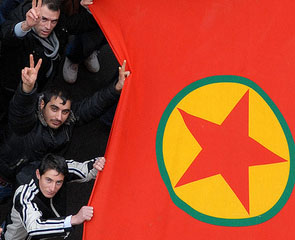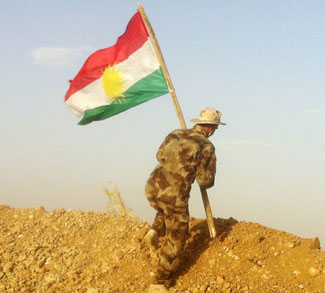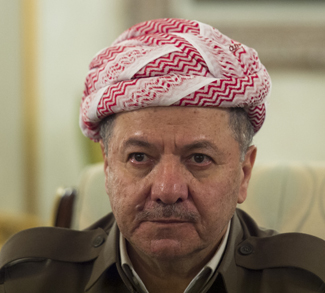Ever since the foundations of the modern Iraqi state were established amid the dissolution of the Ottoman Empire, unstable borders have grouped various religious sects together, many of them harboring historical animosities toward each other. Over the decades, these animosities have periodically boiled over into open sectarian conflict, and the country in its present form remains a powder keg primed to explode.
Examples include the Assyrians, who have withered in numbers since the Seyfo Genocide. Iraqi Jews are nearly extinct, with only a handful left in the country, as they were frequently scapegoated and threatened during the Israel-Arab Conflict. Iraq’s Sunni population detested the new, post-Ottoman Middle East borders, as did the Shiites, who were forced to endure extended periods of rule by Sunni autocrats. And finally, the Kurds were denied statehood by neighbors on all sides, and have suffered several massacres, including a genocide, amid a number of unsuccessful uprisings.
These underlying sectarian tensions were seemingly controlled only via a string of corrupt strongmen using repressive methods to keep the country together – a pattern that was eventually disrupted by the US invasion of Iraq in 2003, which has left Baghdad to this day without a coherent centralized government. The aftermath of the invasion represented an opportunity to explore partitioning the country on ethnic and religious grounds; however, this was not pursued, and sectarian tensions have only worsened since then.
Numerous Sunnis tied to the previous Baathist regime were left out of work with little to no compensation to feed their families. The now Shiite-led government took revenge by denying jobs to them and other Sunnis, and Kurds continued to be alienated from state structures. Moreover, the invasion was a geopolitical gift to Iran, which quickly filled the power vacuum and exerted influence in Iraq, which in turn heightened sectarian tensions between Sunni and Shiite communities.
The destabilization has had a brutal domino effect on various ethnic minorities that have been historically marginalized under the state of Iraq— Yazidis, Kurds, and especially Assyrians. Assyrians and Yazidis, facing a precipitous population decline after the 2003 invasion, are on pace to disappear from their ancestral homelands. The representation of both ethnic groups in the Baghdad government is minuscule, with Assyrians represented in the broader Christian sect representing only five allocated seats in parliament. This year, Yazidis had their quotas revoked in the Iraqi court system, and their population continues to decline in the aftermath of mass kidnappings and ethnic cleansing perpetrated by ISIS.
The Kurds have long sought independence, building an ever-more autonomous Iraqi Kurdistan in the northeast. Numerous failed uprisings have taken place over the years, including the Anfal Genocide by the Baathist regime. After the fall of Saddam and the brutal instability that followed, the Kurds consolidated their hold over the northeast regions and even captured the strategically important city of Kirkuk during the war against Islamic State. In 2017, an independence referendum took place; the vote was swiftly met with a military operation by the Iraqi government, which recaptured Kirkuk and defeated this latest attempt at full independence.
Fast-forward to the present and the country is in the grips of a comprehensive political crisis. It has been over a year since a government has been formed – the longest governance gap since the US invasion. This latest deadlock pits the Sadrist factions, led by Shia Cleric Muqtada al-Sadr, against the pro-Iran Coalition Framework bloc and the Sunni parties.
Violence between the Sadrists and pro-Iran elements is rapidly escalating, calling into question the army’s capacity to quell the violence and, if the situation continues to deteriorate, even the specter of outright civil war. The Iraqi army itself isn’t as strong as the Shiite militias who played a major role in curbing Islamic State’s advance, as evidenced in the infamous incident in 2014 in Mosul when soldiers openly abandoned their posts.
The gridlock in parliament and subsequent clashes have not been the only destabilizing factors: renewed Turkish military attacks have also been unsettling the north of the country. Wary of the growing strength of Kurdish forces, the Turkish government has carried out operations in the Kurdistan region over the past several years.
Along with the displacement of hundreds of thousands of Kurds during the fighting, Assyrian villages have been targeted as well, renewing fears of another mass exodus. The continuous Turkish military presence has also drawn the ire of local residents, with protestors overrunning one military outpost, and Shiite militias firing rockets at Turkish military bases. Ankara’s moves have also drawn criticism from Washington, contributing further to the recent decline in US-Turkey relations.
The political vacuum at the heart of Iraqi politics is pulling the country back toward the same tribalism that fueled perpetual conflict since the dawn of the modern Iraqi state. And so long as parliamentary deadlock prevails in Baghdad, Iraq’s marginalized ethnic groups will continue to suffer. Looking ahead, the question of whether Iraq’s present borders can coexist with a functioning state remains as pertinent as ever and, sadly, if the present infighting and sectarian tensions continue unabated, future conflict is all but assured – with Iraq’s minorities set to bear the heaviest burden in the resulting upheaval.
The views expressed in this article belong to the authors alone and do not necessarily reflect those of Geopoliticalmonitor.com




